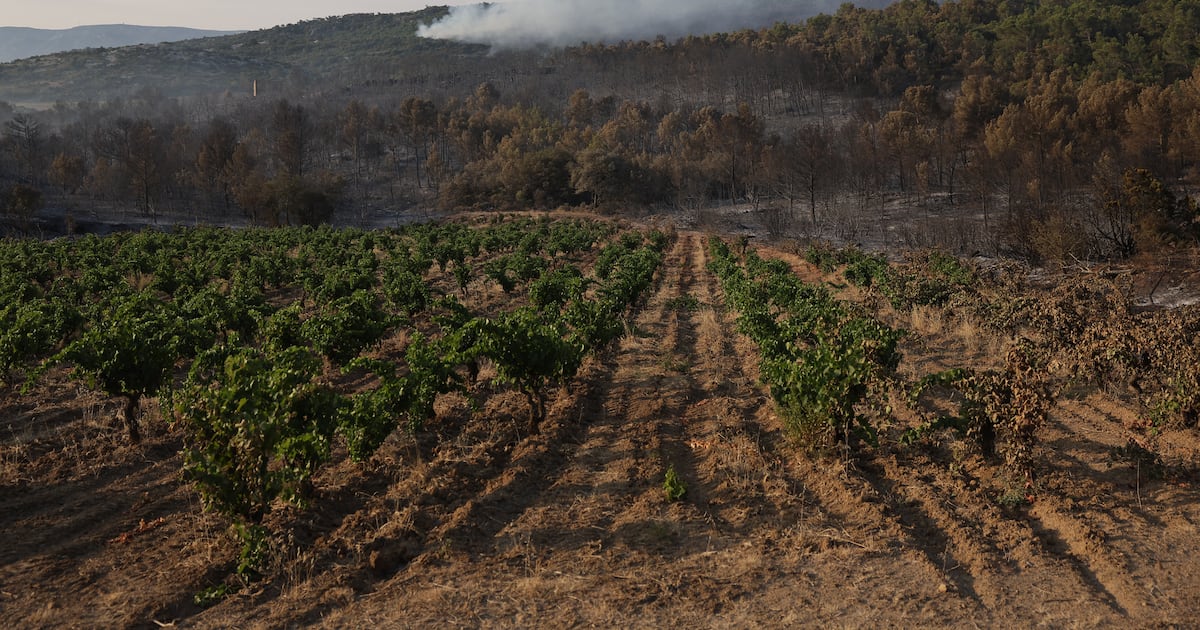World
France Faces Devastating Wildfire as Vineyards Vanish Amid Crisis

In southern France, the Aude region is grappling with its largest wildfire in over seven decades, a disaster intensified by the loss of nearly 5,000 hectares of vineyards in the past year. The wildfire has ravaged an area larger than Paris, driven by strong winds and dry conditions, resulting in significant destruction to homes, forests, and farmland, while claiming at least one life.
On Thursday, approximately 2,000 firefighters battled the flames, which advanced at a rate of up to 5 kilometers per hour. The rapid spread of the fire has been attributed, in part, to the recent removal of vineyards, which historically served as natural barriers against wildfires. French Prime Minister François Bayrou visited the affected areas and noted, “It’s very striking that everywhere where there were vineyards, the fire was for the most part stopped.”
While some vineyards have been scorched, many others have survived, with their grape production severely impacted. Baptiste Cabal, a local vineyard owner in Saint-Laurent-de-La-Cabrerisse, emphasized the need for more vines, stating, “Less idle land and more vines would be much better.” The region has witnessed a 7 percent decline in vineyard acreage this year alone, a continuation of a troubling trend that has persisted for decades.
The French government is currently offering €4,000 per hectare to farmers who uproot their vines as part of a strategy to address the oversupply of wine resulting from changing consumer habits. This initiative has led to the transition to other crops, such as olives and pistachios, which are more suited to the Mediterranean climate. However, local growers argue that alternatives are limited, especially as sheep farming has diminished in the area.
The impact of climate change is particularly evident in Aude, which has been experiencing a drought for three consecutive years. Europe is warming at twice the global average, contributing to conditions that exacerbate the intensity and duration of wildfires. “Vines are the last barrier against fires,” stated Ludovic Roux, president of Aude’s chamber of agriculture, highlighting the critical role that vineyards play in fire prevention.
The destruction of vineyards has raised concerns about the future of local agriculture. Many growers are facing catastrophic losses, with Cabal predicting that at least half of his family’s vines have been damaged. The use of fire retardants has further complicated matters, as grapes from affected plots may not be viable for winemaking due to contamination or altered taste.
Local farmers, including Jerome Despey, vice president of the FNSEA farmers union, stress the importance of preserving existing vineyards while seeking diversification into other crops. “When there’s uprooting, there needs to be diversification with other crops,” Despey said, “But the most important thing is to preserve vines, which are adapted to the Mediterranean climate.”
As the wildfire continues to pose a threat to the region, the stakes for local winemakers remain high. The future of Aude’s wine industry hangs in the balance, with farmers calling for substantial government support to recover from this devastating crisis and to mitigate the risk of future wildfires.
-

 Entertainment1 week ago
Entertainment1 week agoAimee Osbourne Joins Family for Emotional Tribute to Ozzy
-

 Politics2 weeks ago
Politics2 weeks agoDanny Healy-Rae Considers Complaint After Altercation with Garda
-

 Top Stories3 weeks ago
Top Stories3 weeks agoFianna Fáil TDs Urgently Consider Maire Geoghegan-Quinn for Presidency
-

 World3 weeks ago
World3 weeks agoHawaii Commemorates 80 Years Since Hiroshima Bombing with Ceremony
-

 World3 weeks ago
World3 weeks agoGaza Aid Distribution Tragedy: 20 Killed Amid Ongoing Violence
-

 World3 weeks ago
World3 weeks agoCouple Convicted of Murdering Two-Year-Old Grandson in Wales
-

 Top Stories3 weeks ago
Top Stories3 weeks agoClashes Erupt Between Far-Right Groups and Migrants in Spain
-

 World3 weeks ago
World3 weeks agoAristocrat Constance Marten and Partner Convicted of Infant Murder
-

 Top Stories3 weeks ago
Top Stories3 weeks agoHistoric Dalkey Pub The Queens Reopens Under New Management
-

 World3 weeks ago
World3 weeks agoTrump Defends FBI Deputy Director Amid Epstein Files Controversy
-

 Business3 weeks ago
Business3 weeks agoSunshine 106.8 Boosts Irish Music After Regulator’s Request
-

 Politics3 weeks ago
Politics3 weeks agoTragic Crowd Surge at Gaza Aid Center Claims 20 Lives









